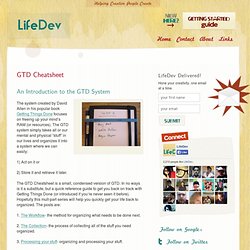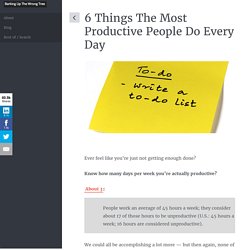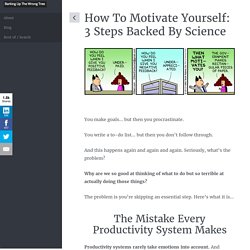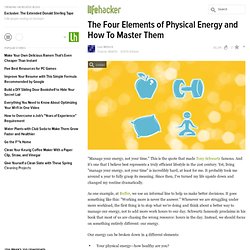

GTD Cheatsheet – An Intro on the GTD system. The system created by David Allen in his popular book Getting Things Done focuses on freeing up your mind’s RAM (or resources).

The GTD system simply takes all or our mental and physical “stuff” in our lives and organizes it into a system where we can easily: 1) Act on it or 2) Store it and retrieve it later. The GTD Cheatsheet is a small, condensed version of GTD. In no ways is it a substitute, but a quick reference guide to get you back on track with Getting Things Done (or introduced if you’re never seen it before). 1. 2. 3. How To Waste Time Properly - Issue 7: Waste. Ever since Frederick Winslow Taylor timed the exact number of seconds that Bethlehem Steel workers took to push shovels into a load of iron ore and then draw them out, maximizing time efficiency has been a holy grail of the American workplace.

But psychologists and neuroscientists are showing us the limits of this attitude: Wasting time, they say, can make you more creative. Even seemingly meaningless activities such as watching cat videos on YouTube may help you solve math problems. Brent Coker, who studies online behavior at the University of Melbourne in Australia, found that people who engage in “workplace Internet leisure browsing” are about 9 percent more productive than those who don’t.
Last year, Jonathan Schooler, a psychology professor at the University of California, Santa Barbara published with his doctoral student Benjamin Baird a study called Inspired by Distraction. Schooler isn’t alone in his conclusion. So what kinds of distractions, exactly, are best? Time Management Skills Are Stupid. Here's What Works. Discover A Better Way of Working - The Energy Project. “Getting Things Done” Six Lazy Ways to Trick Your Brain Into Being Productive. 6 Things The Most Productive People Do Every Day. Ever feel like you’re just not getting enough done?

Know how many days per week you’re actually productive? About 3: People work an average of 45 hours a week; they consider about 17 of those hours to be unproductive (U.S.: 45 hours a week; 16 hours are considered unproductive). We could all be accomplishing a lot more — but then again, none of us wants to be a workaholic either. It’d be great to get tons done and have work/life balance. And who better to ask than Tim Ferriss, author of the international bestseller, The 4-Hour Workweek? (Tim’s blog is here and his podcast is here.) Below are six tips Tim offered, the science behind why they work, and insight from the most productive people around. 1) Manage Your Mood Most productivity systems act like we’re robots — they forget the enormous power of feelings.
50 Tricks to Get Things Done Faster, Better, and More Easily. Time Management Tips: How to Find the Right Mindset to Succeed With Time Management. For the past several years I have worked with time management techniques such as lists, prioritization, planning and so on.

But it wasn’t until I adopted a Quadrant 2 mindset that I really started seeing results. The phrase “Quadrant 2” comes from Stephen Coveys book The 7 Habits of Highly Effective People . Every task you need to do can be split into one of the 4 quadrants: 1. How to tackle the different tasks Each task needs to be tackled in a specific way, at a specific time and handled right. Them the repercussions could be bad. Tasks as you do when working in Quadrant 1 but without all the stress and pressure of the first quadrant. This 15-Minute Activity Will Make You More Successful At Work.
How To Motivate Yourself: 3 Steps Backed By Science. You make goals… but then you procrastinate.

You write a to-do list… but then you don’t follow through. And this happens again and again and again. Seriously, what’s the problem? Why are we so good at thinking of what to do but so terrible at actually doing those things? The problem is you’re skipping an essential step. The Mistake Every Productivity System Makes Productivity systems rarely take emotions into account. We can’t ignore our emotions. And we can’t fight our feelings. Time Management Skills Are Stupid. Here's What Works.
The Four Elements of Physical Energy and How To Master Them. I have a FitBit (glorified pedometer if I ever saw one), and since getting it, my exercise goal each day is to hit 5,000 steps.

On work days, I generally hit 2,000-3,000 each day consistently, meaning I only need to take a walk around the block twice when I get home to meet my goal. Recently, due to winter, I mostly was just pacing back and forth in my apartment while watching Netflix. A process that could take me up to two hours to get those extra 5,000 steps in (it's a small apartment). Now that it's warming up outside, I can get outside and get those steps within half an hour or so, depending on how fast I walk.